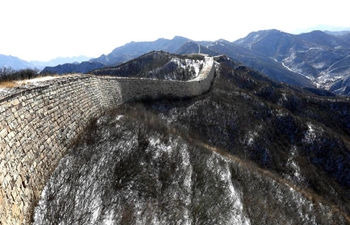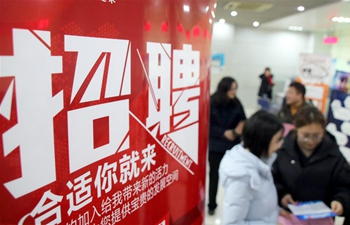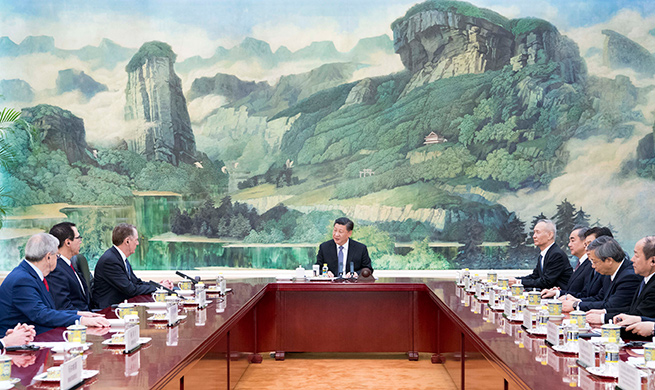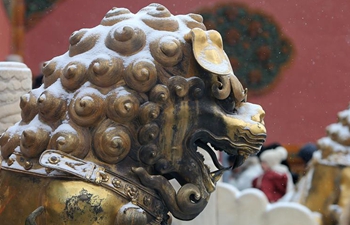PARIS, Feb. 16 (Xinhua) -- Three months after the "Yellow Vests" movement began, discontent people were staging further rallies and protests on Saturday across French cities for the 14th straight weekend of action against French President Emmanuel Macron's economic reforms.
PROTESTS CONTINUE AT WEEKEND
Several hundreds of protesters gathered at La Palace de L'Etoile, waving tricolour flags, many of them calling loudly for Macron to resign. They blocked traffic around the emblematic site of L'Arc de Triomphe, responding to a call of "insurrection" and "to block La Place de L'Etoile as long as possible."
Under the watch of anti-riot police, they marched along the Champs Elysees, where repeated skirmishes between anti-riot police and demonstrators forced France's major tourist magnet to lock down at the previous weekends.
Another faction called on Facebook for another peaceful gathering in Paris on Saturday afternoon, instructing followers "to remain united and peaceful,to be in solidarity, to avoid violent groups, to disperse at the end of the demonstration" which was scheduled for 5:00 p.m. local time (1600 GMT). 5,200 people said were interested.
Similar marches were also reported in French cities in peaceful atmosphere. Further action is also planned on Sunday to mark three months of the movement.
In brief standoffs, anti-riot police fired tear gas to prevent some groups from cruising to adjacent streets and respect the declared route. The situation remained relatively calm compared to last weeks.
Named for the high-visibility jackets all motorists carry in their cars, the social action which started on Nov. 17, 2018 as a social-media protest group initially aimed at denouncing Macron's taxes on fuel that said would further undermine purchasing power.
However, over the weeks, it has evolved into a wider rebellion, with some asked the president to step down and called for a "citizens' initiative referendum" to allow citizens to have stronger say to define the economic and social roadmap for the country.
"I do not see why we have to stop (protesting). They do not listen to us," Chantal, one of the movement's representative in Marseille, south France, was quoted as saying by BFMTV news channel.
"We are discussing (with the government), but since November, we know what we want: a concrete, that is to say, a rise in purchasing power and more public services," she said.
In a bid to quell the anger, France's top official had offered a series of concessions that began in December with a drop of a planned high fuel tax which inspired the nationwide uprising.
The 41-year-old president also offered more concessions to dampen social roar via "an economic and social emergency plan," proposing an increase in minimum wages and tax breaks.
SIGNS OF FATIGUE
Macron came to power in May 2017 on pledges of a new and fair recipe for the country.
But he has witnessed tough months marked by the "Yellow Vest" movement.It had drew 287,710 people on Nov. 17 2018. Three months on, it seems losing momentum as the turnout have been slashed.
Last week, 51,400 people protested country-wide, versus 58,600 on Feb.2. The Interior Ministry counted 69,000 participants on Jan. 26 against 84,000 recorded a week earlier.
The fatigue is also reflected in public opinion. An Elabe poll found, for the first time, that 56 percent of French people thought that the movement has to stop now, up by 11 percentage points than a month ago.
63 percent of 1,001 respondents also said Saturday rallies were no longer in keeping with what "Yellow Vests" initially stood for.
Furthermore, the movement remains amorphous with no leader and internal rifts. Some of its representatives have said they were open to halting the protests and join the table of negotiation with the government.
Others have proposed a list of candidates to run in the election for the European Parliament next May, a move called as a betrayal by other activists.
This deep split in the movement seemed to help Macron to take the winds in his sails.
36 percent of those surveyed by Ifop pollster in February, have a positive view of Macron's action as president.
Positive ratings were up 6 points from January score, pulled higher by "the organization of the national debate and the effect of the announced measures in favour of 'Yellow Vests,'" the pollster said in a survey released on Friday.
After the unrest has pushed his approval ratings to record lows of barely 20 percent, the president launched national consultations on Jan. 15 to dig for the French's complaints the have already expressed in "grievance books."
He pledged to give the consultation's conclusions within a month of the end of the debate on March 15.
In a recent interview to Xinhua, Erwan Lestrohan, an analyst at BVA opinion institute, said Macron's firmness to respond to violent demonstrations and efforts to convince people that he is not out of touch via a series of city hall debates, had gave him impetus.
"What is striking today is Macron's willingness to provide a democratic framework to find solutions to the problems facing the country and which he has to overcome," the analyst said.
"There is a participative process, listening, which I think are important steps he had taken to build with the French what's supposed to be the government's action. And so, he scores one point," he added.
Meanwhile, it's still uncertain if Macron would emerge victorious from the anti-establishment anger spurring the "Yellow Vests."
"Macron is making progress in the method of communication with more speeches, visits, direct talks with people. But, he is still investing much in means more than on the results, on the government's course that certain segment of population still described it as unfair," Lestrohan noted.
"We do not know if this rebound will last... For the moment, we are in the stage of promises," he added.













